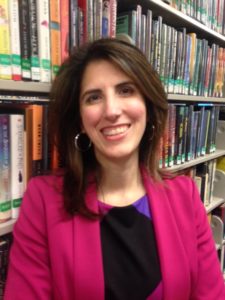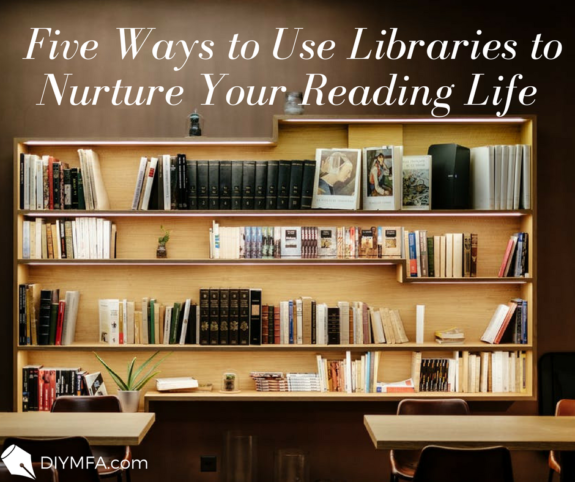Web Editor’s Note: Please join me in welcoming Terri Frank to the DIY MFA team! In addition to being a writer, Terri is a professional librarian, and her column, “Your Personal Librarian” will give you tips and tricks to get more reading done, expand your knowledge of genres and authors and, of course, to read with purpose!
Ray Bradbury left the following advice for all aspiring authors. “Just write everyday of your life. Read intensely. Then see what happens. Most of my friends who are put on that diet have very pleasant careers.”
Bradbury was also an avid library user. He spent ten years of his life going to the library three days per week to write—and to read. Bradbury knew something that a lot of writers don’t. A library can be a useful tool in getting more reading done and reading with purpose. And with ever increasing advances in technology, libraries offer more ways than ever to connect with books inside or outside of their physical buildings.
As someone who is both a practicing librarian and a writer, I’d like to introduce you to these options and share with you some lesser known tricks of the trade. Think of me as your personal librarian and permit me to give you a tour.
1) Getting a Library Card
The first tip may seem obvious, but I find it’s often the most anxiety-provoking. Find your local public library and get a library card. A public library card is the gateway to all the other tips I’ll be sharing with you. If you don’t know where your local library is, you can google “Find my nearest public library” in the United States or use the “Find a library” feature of worldcat.org to locate public libraries worldwide. When you find a public library, be sure to call ahead and confirm that you reside in the library’s service area. Also, ask about identification you’ll need to bring and any fines you may owe from long ago. Don’t be embarrassed about fines. We’ve seen much worse and you wouldn’t believe how often the library’s own staff returns items late (daily!).
2) Ask the Librarian For Help!
Now that you have your library card (and congratulations by the way), come and chat with me at the adult or youth desk. Don’t be afraid if I look like I’m busy. That is simply work I’m doing to keep me from being bored to tears between customers. My real joy is to answer research questions and connect you with life-changing reads.
First, ask me to demonstrate using the library catalog to check our stock and determine where items are located. If you haven’t used a library in a long time, you might be surprised to see me walk you over to a computer. (Card catalogs started disappearing in the 1980’s.) Much like an online bookstore, a library catalog allows you to search for a book by author, title, or subject/keyword and can be accessed via the library’s website. You’ll probably be able to read book summaries, request a text message when a book is ready for you, and obtain titles from other libraries directly from the catalog—increasing the number of books you can read exponentially.
3) Explore Multiple Book Formats
While we’re talking, please ask me about library apps that will let you read e-books and hear audio titles on your mobile device or computer. These apps are only available to subscribing libraries and require a valid library card to activate. If you are away from home and forget to bring a book to read, you can pull out your phone and access one of these apps to read or listen to a book. The titles disappear automatically from your device once the checkout time expires.
Besides traditional books and apps, the library carries books in other formats such as audiobooks on compact disc, large print books, books in foreign languages, and media kits for children. The key to reading often is to have books available to you in different formats at all times. Between the apps and the library’s physical collection, I am always reading three books at once. I have a traditional paper book on my nightstand, a different electronic title on my phone, and a third title on CDI listen to only in my car. (Yes, I have an older car that still has a CDplayer. If you have a newer model or take public transportation, remember the library apps have both e-books and audiobooks.)
4) Expand Your Reading Horizons
When it comes to deriving purpose and meaning out of the books you read, libraries can help with that too. Libraries host a variety of book discussion groups and some are even held off-site at pubs or coffeehouses. Pondering the same book with other people leads to a deeper level of reading. I always find myself saying “I totally missed that!” when someone else mentions a subtle foreshadowing or symbolism I didn’t catch. Most libraries also have at least one writing group that meets regularly. Writers trade pages and informally critique each other’s work. Sometimes, specific writing topics like voice or publishing are presented by the group’s leader or an invited speaker. Finally, your library card gives you access to private library databases that offer a wealth of literary criticism and suggestions for finding your next great read. Of course, you can also ask me for a suggestion. Librarians receive training in the art of reader’s advisory and there’s no substitute for a word of mouth suggestion.
5) Stock Your Shelves
If you’re visiting during a library book sale, stop in and take a peek. Libraries sell their used books and it can be a good way to stock your personal shelves. I keep a lookout for dictionaries, thesauri, style guides and antique books for my home library, but you might find unique books by local authors or a long out-of-print title penned by your favorite author years ago.
At the end of Ray Bradbury’s decade long experiment in the public library, he had read every book in the library and wrote over 1,000 stories. He proved that reading the works of others is the conduit to creating your own. A visit to the library can take your reading life from an irregular bud, sparse and untended, to a frequent and blooming garden. I’ll see you there.
Do you have any helpful ways you use the library to nurture your reading? If so, please help out the DIYMFA community and comment below!
 Terri Frank is a professional librarian and holds a Master’s degree in library and information science from the University of Michigan. When she’s not working in a library, she’s probably visiting a library with her husband and two kids. Her current writing projects include a novel about a tuberculosis sanitorium.
Terri Frank is a professional librarian and holds a Master’s degree in library and information science from the University of Michigan. When she’s not working in a library, she’s probably visiting a library with her husband and two kids. Her current writing projects include a novel about a tuberculosis sanitorium.







